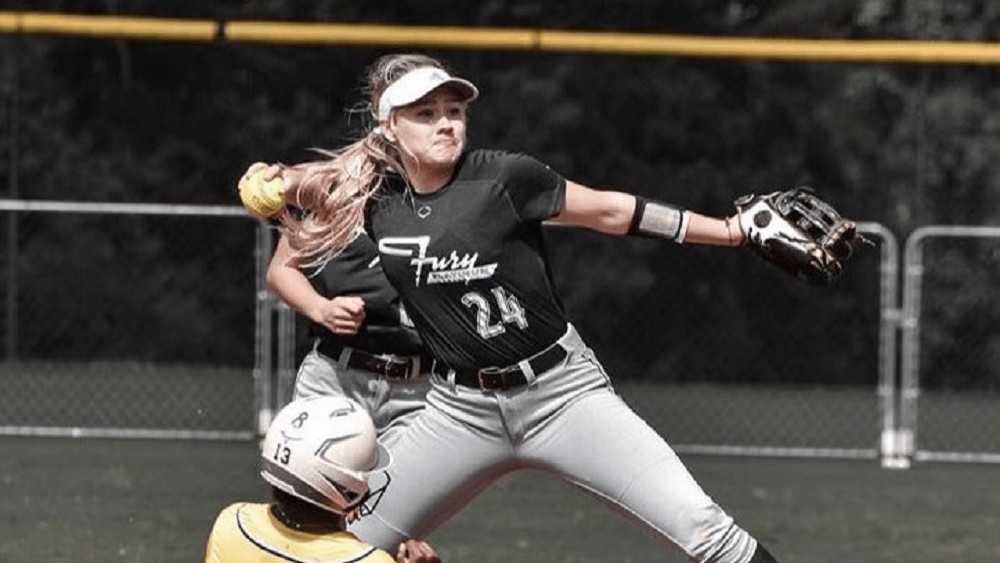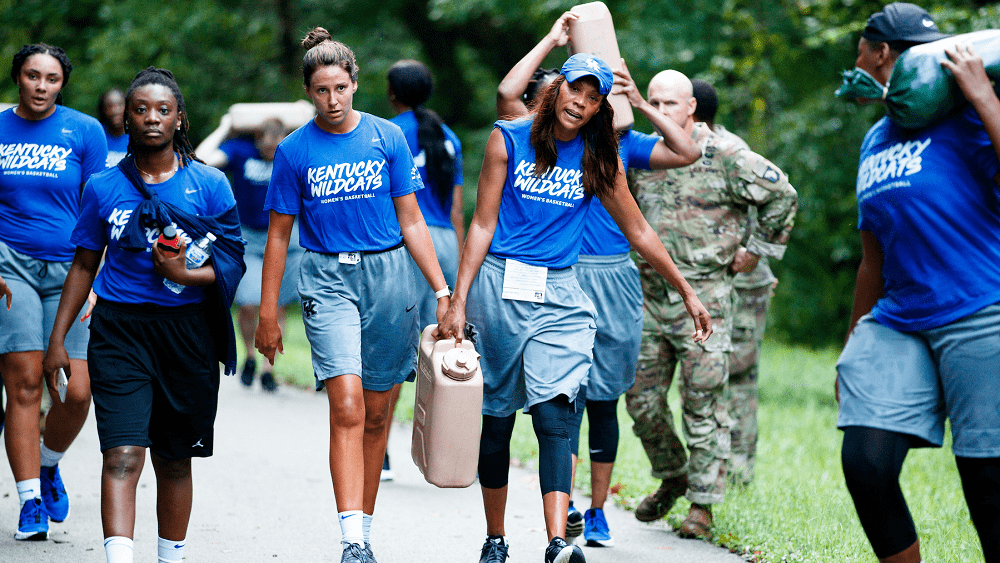
[Image from Wikipedia]
Sports reporters usually don’t mind waking up in the morning and wondering what they are going to write about. But what if that happens every day for nearly three months?
When COVID-19 caused spring sports to be canceled to protect against the spread of the coronavirus, coaches and athletes weren’t the only ones left scrambling.
Sports reporters who were preparing to transition from covering basketball to the busy spring sports schedule had to come up with new stories while providing content on a daily basis. Some writers and reporters weren’t as fortunate as some media companies chose to lay off or furlough the people responsible for providing local sports. Many still haven’t returned to work.
When sports shut down in March, the sports writers and reporters across the state who had the responsibility of churning out sports content turned to history to continue to tell the stories of sports in their communities.
I’m a huge fan of local sports history. I enjoy hearing the stories and talking to different people about their versions of the stories told. But as any reporter or historian will tell you, researching those types of stories take a lot of time to do them the proper justice. You just can’t do one of them every single day for two months.
In the coming weeks at YourSportsEdge.com, you will read about trips to the state baseball championship games by Cadiz High School and Hopkinsville High. We have already published stories about Caldwell County basketball legend Dwight Smith, rare video of the first soccer game between Hopkinsville and Christian County at the Stadium of Champions, and a look at the Second Region African-American schools that made up the Kentucky High School Athletic League.
Reporters across the state have dug into the archives to continue the work of providing local sports.
“Those sorts of stories have always been my favorite, the ones you get to take a little more time on and talk to lots of sources,” said Zack Klemme, sports editor of the Ashland Daily Independent.
“While this thing has been terrible for journalism in a lot of ways, it has given us a little more time to dig into those things, which has been kind of a silver lining.”
Time away from the diamonds and track in not covering games every single day allowed Klemme the time to research and write a story on the Johnson Central-Leslie County football series in the 1990s that matched future No. 1 NFL Draft pick Tom Couch going head to head three times with future country singer Chris Stapleton.
Kevin Patton, long-time sports editor at the Henderson Gleaner, is another reporter who took to the archives to help with news content.
“Shortly after the sports shutdown, I have written at least one historical-type story each week. Because I’ve worked at the Gleaner a significant amount of time (24 years), I’ve focused on that time period just because it is what I know,” he said. “I don’t think I learned anything I didn’t know already, but I have remembered things that I had forgotten about.”
Patton compiled lists of the top Henderson County boys’ and girls’ basketball teams as well as the baseball and softball teams in his time at the Gleaner.
“Now, I’m in the process of counting down the top 75 Henderson County games of my era — that includes football, basketball, baseball, soccer and volleyball. That should keep me occupied for a few weeks, but I suspect there will be more of these type of stories throughout the summer.”
Ed Marlowe, sports editor at the Paducah Sun, has also taken to history but in a more of a timeline fashion to remind people of past feats.
“I hit up newspapers.com, where millions of pages — including those of the Sun — have been uploaded from years past. Much like a community calendar, we’ve been daily typing up “On this day in the Sun…,” and it’s been a massive hit,” said Marlowe, who added he looks to make the feature a consistent element of his sports section moving forward.
“Because of doing it daily, I’ve been able to read along storylines that occurred one, five, 10, 15, 20, 30, 40 and 50 years ago. From Jerry Anderson’s perfect game at Murray State, to the consolidation of McCracken County High School, to Ja Morant’s run in the 2019 NCAA Tournament, it’s been fun to watch it unfold in past pages,” Marlowe said.
Evan Dennison, sports editor of the Ledger Independent newspaper in Maysville, has also used the added time away from the fields to not only do research but learn from what he is uncovering.
“It’s neat to read up on some special teams and players during their eras. Some of. the stuff I already knew, but other stuff you realize you haven’t heard before, and that makes it fun,” said Dennison, who added he has the help of a local historian who provides a narrow time frame of past events that helps knock down the time it takes to research and find the appropriate information.
However, the lack of sports isn’t limited to high school.
Jared Peck is just months into his job as the digital sports writer at the Lexington Herald-Leader. Peck, who formerly worked at the Paducah Sun with the late sports writer Joey Fosko and attended Lone Oak High School, says University of Kentucky sports is their primary content driver and that has been reflected in their historical coverage.
“I would say our look to the past for content has been limited to UK legends, because we know that will deliver readers consistently. I’m contributing to that “We Meet Again” series and my first one on Henry Clay product Shane Boyd ran in April. It has been one of my most read stories of the year,” Peck said.
The Herald-Leader also ran a series on the boys’ Sweet 16 teams that saw their seasons cut short due to COVID-19.
“We also highlighted Lexington teams by finding the best spring sports feature at each school despite not playing. My first one came from Bryan Station as the kickoff to the series,” Peck said.
Another feature Peck had time to research and write was a piece on former Henry Clay basketball coach Bob Tripture, the only coach to lead two girls’ teams to Sweet 16 titles.
Newspapers and websites aren’t the only outlets to look for local content. Jeff Bidwell is the sports director at WPSD-TV in Paducah. He said they were able to tap their video archives to provide college basketball highlights at a time when March Madness was being canceled.
“There was a such an immediate thirst for college basketball when the tournament was canceled, it was a logical move for us to pull out famous games for Murray State or Kentucky on the anniversary of when they were played,” Bidwell said. “We likely would have done this, pandemic or not, on March 18th when he looked back at the ten-year anniversary of Danero Thomas’ shot to beat Vanderbilt in the 2010 NCAA Tournament. We were able to track down several of the guys from the team which allowed us to look back, but also put a forward-spin on it.”
Having access to the video library also gave Bidwell a chance to relive some of his personal favorites.
“It definitely game me a chance to walk-down memory lane and revisit, selfishly, some of my most favorite moments from my career. The fact viewers liked them as well was a definite bonus.”
Patton said the ability for past coaches and athletes to reconnect through his stories wasn’t lost on him.
“I think one thing it has done is that it has reconnected some of the former athletes and their families with the Gleaner, especially the ones who no longer live here,” Patton said.
Digging through the archives and researching the past will also have its benefits for reporters moving forward.
“This has reminded me that doing a little bit of research goes a long way. So often, we find ourselves rushed into quick stories with little context. This slowdown is *forcing* people to find context and meaning,” Marlowe said.
Klemme added to that.
“It’s really shown how important sources are and made reporters sharpen their newsgathering skills because the buffet of story ideas that come from a normal sports season just disappeared. It has kind of forced our industry to grind — not that a lot of sports media didn’t already, but this is unlike anything most of us have worked through and we don’t really know how much longer we’ll have to do it,” Klemme said.
While COVID-19 took high school and college sports off the fields in the spring, sports writers and reporters worked hard to make sure it didn’t remove sports from of our daily lives. And it’s made us all better.



